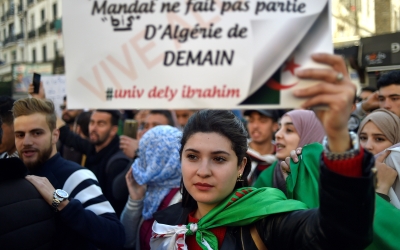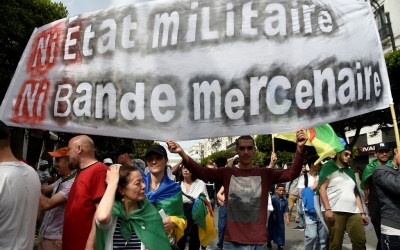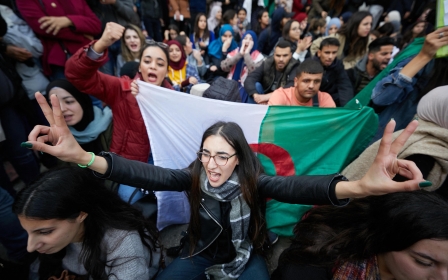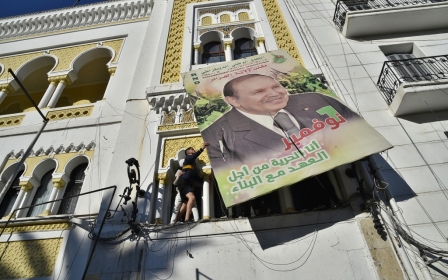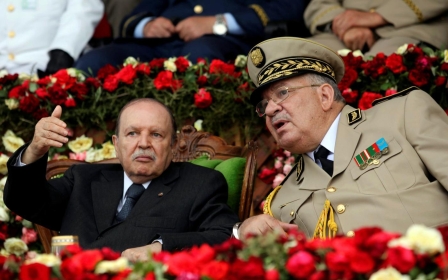The 'secret history' of Abdelaziz Bouteflika's last days in power
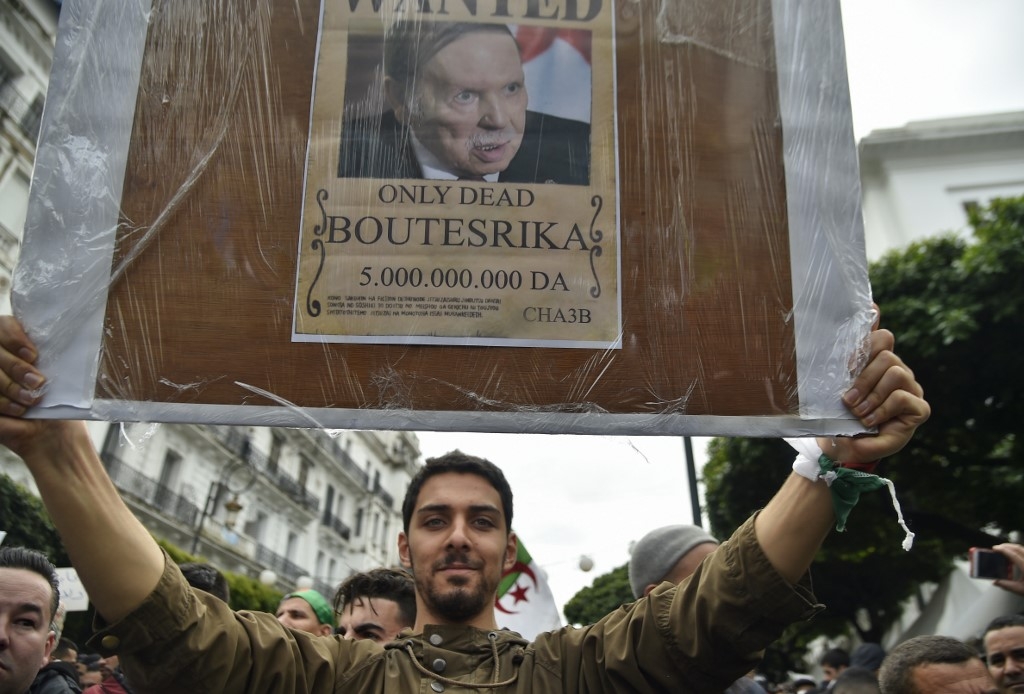
The fate of former Algerian President Abdelaziz Bouteflika was no doubt sealed during the summer of 2018.
According to the recently published biography by journalist Farid Alilat, Bouteflika, l’histoire secrete, it was probably the work of Said, Zhor and Nacer Bouteflika - the ailing president’s “family council” - who met during that summer.
“Said was the most adamant. Relinquishing family power was out of the question,” Alilat writes. “The president could and would stand for re-election. And of course, there were Said’s oligarch pals, with whom he dined nearly every evening. They were pressuring him, too. His argument was simple: if Bouteflika bowed out, all of the regime’s supporters and financial backers, the members of its inner circle, would be exiled or imprisoned.”
Said Bouteflika's 'plans'
The idea was to rally support for an alternative plan put forward by Abderrezak Makri, president of the Muslim Brotherhood-affiliated Movement for the Society of Peace. Makri had called for a five-year transition period to settle the crisis set off by the president’s poor health - with Bouteflika remaining in power.
New MEE newsletter: Jerusalem Dispatch
Sign up to get the latest insights and analysis on Israel-Palestine, alongside Turkey Unpacked and other MEE newsletters
“Two months later, after a lot of uncertainty and shilly-shallying, Makri agreed to talk to Said. On Thursday 18 October, the two men, who were distant acquaintances, met in Zeralda at the president’s assisted living facility. Said told his guest the president was extremely ill, then gave him his spiel,” Alilat writes.
“‘He’s unable to speak. That’s why he no longer welcomes foreign guests. We’ve talked it over as a family. We think it’s time to reach out to the opposition, to find an honourable way out of the current dilemma.’
"Whether he was bluffing or not, Said said Bouteflika was against standing for re-election. ‘The president doesn’t want a fifth term in office. The people who are in favour of it have their own interests at heart, not those of the president. The feedback has been negative both at home and abroad,’” the president’s brother is quoted as saying.
But both the opposition parties to whom he reached out, and the military commanders who claimed to be bound by the framework of the constitution, refused to form an alliance with the family. So, in early 2019, the Bouteflika clan chose to go the road of the ill-fated fifth term.
The presidential bid of the ailing Bouteflika, all but mute and barely seen in public since 2012, sent shockwaves through the nation. Demonstrations were staged in cities across the country, and on 22 February 2019, the streets of Algiers were flooded by protesters against the president’s rule.
The army dithers
The regime was shaken to its very core. “Senior military officials were increasingly critical of [military chief Ahmed] Gaid Salah’s unwavering support of a fifth term for the president. The generals around him knew the protest movement was unstoppable,” Alilat writes.
“The situation was untenable. They had to choose between saving Bouteflika and saving Algeria. Within the army general staff, those in favour of maintaining the president could be counted on a single hand, and the generals were pressuring Salah to admit defeat.”
'His objective was quite simple: to get the head of state to step down. The army chief-of-staff told them it was time to call it quits'
On 24 March, after yet another mass demonstration, Salah made up his mind at last.
“Ahmed Gaid Salah went to Zeralda to meet with the Bouteflika inner circle, namely the president, and his sister and two brothers. His objective was quite simple: to get the head of state to step down. The army chief of staff told them it was time to call it quits. The president needed to resign in accordance with Article 102 of the Constitution.”
Said Bouteflika initially agreed, but as soon as Gaid Salah left the compound, the president’s brother turned against him.
Getting rid of Gaid Salah
“The army chief of staff left the premises. The family had no intention whatsoever of stepping aside. No concessions would be made, nothing given up. For the past several days, Said had been in contact with General Mohamed Mediene [former head of secret services]. The two men had gotten afoot an alternative plan that would allow the president and his entourage to remain in power until a successor was named,” Alilat recounts.
“The plan required getting rid of Ahmed Gaid Salah, the obstacle now standing between Bouteflika and the presidency. The day after the meeting, the army commander returned to Zeralda to make sure they were still onboard. He was welcomed by the president’s sister and an old family friend.
“The president was resting, apparently not well. His brothers, Said and Nacer, were absent. This, together with the wiretap and surveillance information on Said and his friends revealing a plot against the army chief of staff, broke Gaid Salah’s faith in Bouteflika once and for all.”
What happened next? The army publicly summoned the president to step down in a message delivered by none other than the chief of staff himself - the former staunch supporter of Bouteflika. Nonetheless, the presidential coterie made a last-ditch attempt to push forward with their own plan: Bouteflika would be kept in office, former president Liamine Zeroual would lead the transitional government, and Ahmed Gaid Salah would be ousted.
The army strikes back
On the evening of 30 March, Said Bouteflika called the former defence minister, Khaled Nezzar. “He told him the army chief of staff was at a meeting with the commanders of the armed forces, and that he might make an attempt on the compound in Zeralda,” Alilat writes. “He added that the head of state was considering the immediate removal of Gaid Salah.”
Next, according to Alilat’s sources, on the evening of 30 March, “special forces secretly entered the headquarters of the national television station, while placing the country’s private channels under surveillance as well. They wanted to intercept a dispatch announcing the unseating of Ahmed Gaid Salah and the appointment of General Said Bey, the former commander of the 2nd Military Region.”
'As soon as he realised Bouteflika and his siblings had betrayed him ... Ahmed Gaid Salah acted without remorse. He showed them no mercy'
The head of the army would not be deposed. Instead, he would resume control and, on 2 April 2019, deliver a fatal blow.
“The entire general staff met at the Ministry of Defence. The deputy minister of defence, [Gaid Salah], told the generals that the Bouteflikas were plotting to depose him. He claimed to have documents, videos and recordings to prove it,” Alilat writes.
The meeting lasted well into the afternoon. At 5pm, Gaid Salah called Mohamed Rougab, Bouteflika’s private secretary: “Tell the president to announce his resignation by 8pm today.”
According to Alilat, “Rougab said he needed more time to get to Zeralda to write the press release. Gaid Salah refused, threatening to surround the Bouteflika compound if he didn’t comply at once.”
On 2 April at 8pm, the president appeared in his bathrobe on Algerian TV, presenting a letter of resignation to the presidents of the senate and the constitutional council.
“The fall of the house of Bouteflika is also a story of betrayal,” Alilat concludes. “As soon as he realised Bouteflika and his siblings had betrayed him, by promising the president would step down, Ahmed Gaid Salah acted without remorse. He showed them no mercy.”
This article was translated from the MEE French edition.
Middle East Eye delivers independent and unrivalled coverage and analysis of the Middle East, North Africa and beyond. To learn more about republishing this content and the associated fees, please fill out this form. More about MEE can be found here.



